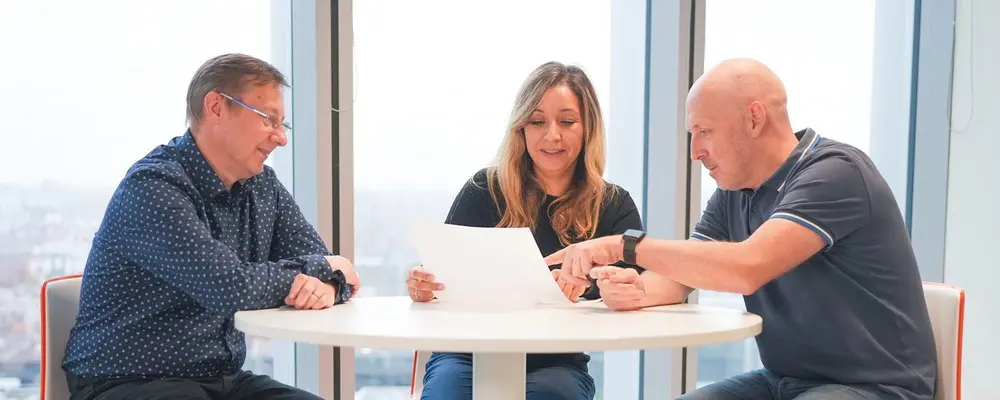INTERVIEW with the Regional Housing Inspectorate Investigation Unit
To ensure compliance with the standards imposed by the Brussels Housing Code, the DIRL (Regional Housing Inspectorate) has three investigation units staffed by inspectors and architects, who check the compliance, safety and salubrity of a rental property. Interview with Samira Assassi, Inspector, David Van Geertruye, Architect and Unit Coordinator, and Thierry Billiet, Head of Investigation Unit Management.

From left to right: Thierry Billiet, SamiraAssassi, David Van Geertruye
What is the role of the investigation units?
Assassi: "The DIRL's investigation units are responsible for carrying out housing inspection visits. Inspectors and architects check that housing meets basic safety, health and equipment requirements. Our mission is to combat the renting out of non-decent or even insalubrious accommodation, very often at prohibitive rents."
Billiet: "But the role of the investigation units goes beyond this since it includes all the administrative processing of the files, from planning the visit to drafting letters prohibiting rental or issuing compliance control certificates."
Assassi: "And of course, during this period, the inspector is the main contact for landlords and tenants. This involves a great deal of contact by email, telephone and post."
Van Geertruye: "One of the investigation units has a special role in investigating serious Housing Code violations, initiative visits and monitoring properties subject to rental bans. This unit develops close contacts with the municipalities and local police services."
How are inspection visits carried out?
Assassi: "The inspectors usually go to visit housing in pairs. The tenant must be present or have someone present to open the door. The landlord is invited to the visit but is not required to attend. We also carry out visits to empty properties if the tenant has had to vacate them following a complaint, and advise landlords on the work to be carried out on any defects found so that they can re-let their property in the future."
Van Geertruye: "Inspectors start by making a floor plan of the property, taking photos in the home and in the building's communal areas to get an overall view of the premises and images of any defects found. They note any breaches of basic safety, health and equipment requirements, and then write up their report."
Assassi: "In their backpacks, inspectors keep a variety of equipment to identify defects: a laser rangefinder, two humidity testers, a multimeter and sometimes an anemometer, but their main tools are their eyes and their experience."
Billiet: "Sometimes, visits can take place in a tense context. Disagreements between landlord and tenant can degenerate into conflict, and inspectors have to be very diplomatic if they are to carry out their work calmly. Given the serious penalties that the visit can entail, the landlord sometimes displays hostile behaviour and obstructs the visit. Inspectors need not only the necessary technical background but also excellent behavioural skills."
Is your policy purely repressive?
Billiet: "Of course not! We also have a duty to help landlords become aware of the defects in their homes. Not all landlords are slum landlords - quite the contrary. We are also here to support them and answer any questions they may have. But, of course, we have no choice but to crack down when housing is unsafe."
Van Geertruye: "In our reports, we describe the defects we find, but we also indicate the work that needs to be done to make the home compliant. Sometimes, our support even goes so far as to examine possible solutions with the landlord to resolve a complex non-compliance problem. This can go as far as a complete redesign of the space."
Assassi: "At the landlord's request, we organise a technical meeting with them to review the shortcomings and the work to be done and to make sure they have understood them. It is in all our interests that the property is brought up to standard quickly; it is good for the landlord, for the potential tenant, for us and above all for the Brussels rental market."
What are your challenges and your ambitions for the future?
Van Geertruye: "We want to continue the work of our research unit, which tracks down the most seriously substandard and unfit housing. We also hope to free up more resources to intensify our systematic monitoring of properties with a rental ban, to prevent them from fraudulently re-entering the rental market. But at the moment, the number of complaints is at record levels, which means we cannot yet be as involved as we would like."
Billiet: Another challenge is revising the basic safety, health and equipment requirements. We have already done a lot of drafting work, which has been approved by the government. But the approval process has yet to be completed, and we still need to prepare for entry into force by providing extensive information to landlords on the new rules. This will keep us busy for years to come."
Assassi: "We never lose sight of our mission and ambition, which is to improve the quality of housing in Brussels. It is rather strange to say, but our dream would be for Brussels to no longer need us and, as the capital of Europe, for our City-Region to set an example and really be able to offer all Brussels residents decent housing."
Watch the video portrait of two inspectors from the Regional Housing Inspectorate, who reveal what their job really entails: